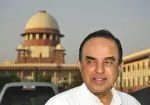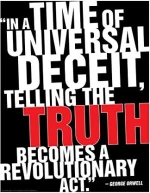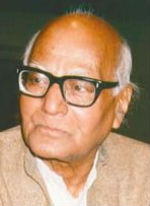 “The world cannot afford the ruination that an Iran war could wreak upon us all. De-escalation of the crisis is imperative. For a start, the major capitals must ensure that the United Nations ceases to serve as a handmaiden of western colonial interests.” – Sandhya Jain
“The world cannot afford the ruination that an Iran war could wreak upon us all. De-escalation of the crisis is imperative. For a start, the major capitals must ensure that the United Nations ceases to serve as a handmaiden of western colonial interests.” – Sandhya Jain
 New Delhi has moved with commendable alacrity to clarify that it has not asked oil firms to reduce crude imports from Tehran. Iran remains India’s second largest crude oil supplier despite the UPA’s twice voting that the International Atomic Energy Commission refer Iran’s nuclear issue to the Security Council in February 2006 and November 2009. Both times New Delhi could have abstained; the mindless quest for a strategic partnership with America nearly compromised the national interest.
New Delhi has moved with commendable alacrity to clarify that it has not asked oil firms to reduce crude imports from Tehran. Iran remains India’s second largest crude oil supplier despite the UPA’s twice voting that the International Atomic Energy Commission refer Iran’s nuclear issue to the Security Council in February 2006 and November 2009. Both times New Delhi could have abstained; the mindless quest for a strategic partnership with America nearly compromised the national interest.
The need for caution has doubled. As Washington escalates tension with Tehran, Defense Secretary Leon Panetta admitted on CBS’ Face the Nation programme [Jan. 8] that despite the rhetoric, America was aware that Iran is not developing nuclear weapons but is only pursuing “a nuclear capability”.
Yet the Obama Administration last December enacted a law under which the US can impose sanctions on any financial institution dealing with Iran’s central bank, its main clearing house for oil payments. This could jeopardize India’s oil payment system which is currently routed through Turkey’s Halkbank; a delegation to Tehran on Jan. 16 is expected to take up the matter.
The Washington-Tehran face-off is causing unease in world capitals as the Iranian resistance is likely to be superior to what America and its allies faced in Iraq, Libya, and Afghanistan. In all these theatres, the Western allies bludgeoned the states with brute military force, but had no strategy to hold the ground thereafter. Hence America ran from Iraq and is trying to quit Afghanistan; the Libya story has yet to unfold.
 A conflict with Iran will not be one-sided. For one, Russia under Vladimir Putin, aligned with China and Tehran, with silent approval from nations like India and Germany that seek energy security by peaceful means, may resist US-led Western hegemony more forcefully. Both Moscow and Beijing feel remorse at permitting the shoddy politics in the United Nations and handing over Libya and Col. Gaddafi to the oil-hungry NATO powers.
A conflict with Iran will not be one-sided. For one, Russia under Vladimir Putin, aligned with China and Tehran, with silent approval from nations like India and Germany that seek energy security by peaceful means, may resist US-led Western hegemony more forcefully. Both Moscow and Beijing feel remorse at permitting the shoddy politics in the United Nations and handing over Libya and Col. Gaddafi to the oil-hungry NATO powers.
Already amidst escalating uncertainties, China, Russia, Iran, India, Brazil, Venezuela and other nations have moved to do bilateral trade in their own currencies and avoid using the US dollar as reserve currency. Indeed, Saddam Hussein’s decision not to sell oil in US dollars and Muammar Gaddafi’s quest for the Arab gold dinar led to their deaths and ruination of their countries. Now Mahmud Ahmadinejad also seeks an alternate currency to the dollar, causing Washington to stride towards a showdown with Tehran.
Nevertheless, Washington will have to come to terms with the fact that its currency – once the world’s reserve currency – is losing traction in international trade. China and Japan now trade in bilateral currencies and Russia is making similar deals with major trade partners. In fact, one reason why Washington attacked the Euro in 2009 was to nix its emerging as the new international reserve currency. But this has failed to restore dollar hegemony.
Once he becomes the Russian President, Mr. Putin is likely to resist the US on Iran, and also to address the issue of NATO’s encirclement of Russia with ballistic missile installations. He will almost certainly intensify energy politics via pipeline diplomacy with NATO members such as Germany, France and Italy, to woo them away from Washington.
 That leaves America with only formidable military power, which is not enough without commensurate economic might. Washington could fund the fighting in Iraq, Afghanistan, Syria, Libya and other places because China and other trade surplus nations invested in US Treasury debt. They will now shift, cutting Washington adrift at a time when it needs to throttle the emerging Russia-China-Iran axis.
That leaves America with only formidable military power, which is not enough without commensurate economic might. Washington could fund the fighting in Iraq, Afghanistan, Syria, Libya and other places because China and other trade surplus nations invested in US Treasury debt. They will now shift, cutting Washington adrift at a time when it needs to throttle the emerging Russia-China-Iran axis.
The core issue is that as the need for energy security increases the mutual interdependence of nations, Washington seeks monopolistic control over the raw materials of other nations. Confrontation and conflict are built into this 19th century style buccaneering ideal; war clouds now loom over Tehran.
We now have two contending worldviews. One buys what it desires by negotiating price; the other grabs (or tries to) what is desires regardless of the price it (and others) may have to pay. Should a Third World War break out, it will differ from the First and Second World Wars where rival colonial factions fought for hegemony. This time, the winners of the two Wars are on the rampage; they have lost the propaganda war as their naked greed has been exposed in the public arena and their opponents are not colonial raiders.
The Strait of Hormuz that links the Persian Gulf with the Indian Ocean has emerged as the axis mundi of international politics. Twenty percent of the world’s daily energy supply [17 million barrels of oil] passes through this waterway, which is the sole maritime link between the oil-producing Iran, Iraq, Kuwait, Qatar, Saudi Arabia, UAE, and the rest of the world. Last month, Iran threatened to  block the strait in anger at Washington’s new sanctions against her oil exports. A lengthy closure could cause a 50% spurt in oil prices and wreck the global economy.
block the strait in anger at Washington’s new sanctions against her oil exports. A lengthy closure could cause a 50% spurt in oil prices and wreck the global economy.
Attitudes have hardened with the assassinations of Iranian nuclear scientists with chilling regularity over the past two years. In January 2010, a remote-controlled bomb attached to a motorcycle killed Masoud Ali Mohammadi, 50; he taught neutron physics at Tehran University. In November 2010, two separate car bombs exploded on the same day – one killed nuclear scientist Majid Shahriar and injured his wife; the other wounded nuclear scientist Fereidoun Abbasi and his wife.
In July 2011, Iran’s Atomic Energy Organization member Darioush Rezaei, 35, was shot dead and his wife injured by two gunmen firing from motorcycles outside their daughter’s kindergarten; he was a specialist in neutron transport which lies at the core of nuclear chain reactions in reactors. On 11 January 2012, Prof. Mostafa Ahmadi-Roshan, 32, was killed when a motorcycle-borne assailant attached a magnetic bomb to his car, which detonated and killed him.
Iran is justly enraged and will fight for her honour and sovereignty. Recently, it conducted naval exercises in the Arabian Sea near the strait and sternly warned American aircraft carrier, USS John C. Stennis, which has just left the Gulf, not to return. The world cannot afford the ruination that an Iran war could wreak upon us all. De-escalation of the crisis is imperative. For a start, the major capitals must ensure that the United Nations ceases to serve as a handmaiden of western colonial interests.
» Sandhya Jain is the Editor of www.vijayvaani.com
Filed under: india, USA | Tagged: atomic energy commission, economics, geopolitics, globalisation, hegemony, iran nuclear programme, israel, leon panetta, nuclear power, oil, strait of hormuz, third world war, USA |


























IS,
It is very succinctly put by Sandhya Jain. Let me disappoint her before I go further. She is an astute journalist, far better than me. I have been commenting on the very theme far over last one year in the major English media. I am sorry to give a gloomy picture here.
It reminds me of Geeta. I was just talking to my daughter-in-law on the same theme but related to family matters. The cause may differ but not the result and the methodology.
Mahabharata was a fight between two brothers’ dynasty over the heirdom of kingdom. In Hinduism, we say that Lord Krishna was a Purnaavataar having all sixteen faculties and the only Avatar with such a powerful ‘Shakti’ in Him. Did He not do His best to avert that deadliest war? He was ready to compromise with Duryodana at every possible minimum terms. Yet the war escalated. Again Arjun is known to be averse to that war and tells Krishna that he doesn’t want to fight his own kith and kins, etc and then Krishna coaxed him in. Rest all you know it.
By siting this example, I want to state that this WW III which Sandhya hopes to avert has become a necessity. Again I shall raw your kind attention to the same sacred scripture where the Lord asserts that I reincarnate on this earth, whenever there is evil overwhelming the righteousness to destroy the sinners to liberate the pious people. Ch. 4, verse 7. Vide the link: http://www.asitis.com/4/7.html
Not that you don’t know, just a ready reckoner. I am not good at Sanskrit but I love Srimad Bhagwad Geeta for its esoteric meaning which even applies to all of us in our own personal lives.
This takes me to the recent controversy surrounding the Sri Satya Sai Baba casting away His mortal coils sooner than He used to assert. I am not going into the controversy here but who can know His Divine plans until s/he is able to understand His Divine language.
I am still not sure, “If He cast His coils earlier in His Divine plans”? But as I have been visiting His Prashanti Nilayam (At His Grace) frequently, I am grateful to Him for reforming me; I have tried to study Him a little bit in my own way.
Baba came here to preach peace, love and righteousness, perhaps in the same way to avoid this deadly war, we are discussing it. Perhaps Swami couldn’t have been a witness to such gory incidence, He has left earlier leaving the situation of inevitable to happen. We all come across such situations even in our own lives when we become heLpless and leave the matters to fate or whatever you call it.
This WW III will most likely occur at the peak of the US election fever as Obama’s fight get tougher. He will look at it as the best technique to divert the attention of the common people on one hand and rally round the opposition support by raising the pitch of patriotism to eliminate the opposition to his elections. You know it all, how these scoundrels can ruin their own people and country when their personal interests collide.
I am sorry to disapoint you all but the inevitable cannot be averted, nature has its own course to deal with us in its own subtle ways.
God bless
LikeLike